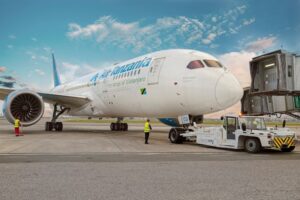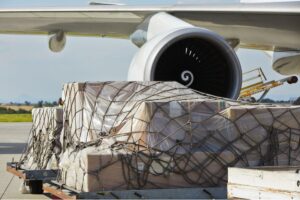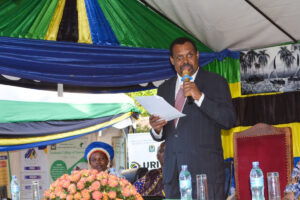
Dar es Salaam. East Africa is making strides to reform its mining sector, aiming at striking a balance between foreign investment and socio-economic development in respective countries.
Mineral Ministers from Tanzania, Kenya, and Uganda have expressed a shared commitment to ensure that the region’s vast mineral wealth benefits its citizens and drives economic growth.
They shared their commitment during a recent “Minerals Night” held in Dar es Salaam, marking the conclusion of a three-day mining conference that gathered leaders from different bloc member countries.
This shift in approach underscores the need for cooperation, and value addition marks a critical step towards addressing historical imbalances that have left many communities sidelined.
“We must ensure that our citizens benefit from their resources,” said Tanzania’s Minerals minister, Mr Anthony Mavunde.
He elaborated that initiatives including establishing and strengthening processing zones and community-based mining cooperatives will ensure local employment opportunities and improved revenue sharing.
For example, processing plants for Tanzanite in Arusha are already employing hundreds and boosting local economies.
“To achieve this, we are establishing processing zones to promote value addition and ensure that our people directly benefit from natural wealth. This is the common goal we need to have in East Africa as a region,” he said.
Kenya’s Cabinet Secretary for Mining and Blue Economy, Mr Hassan Joho, echoed the sentiment, emphasising the importance of balancing foreign and local interests.
“We need to promote investments, but not at the expense of our citizens,” he said. “Our policies must align across the region so that what is prohibited in one country is uniformly enforced across all three members,” he added.
Uganda’s minister of Energy and Mineral Development, Ms Phiona Nyamutoro, highlighted the value of regional collaboration.
“We should not push our mineral resources independently. Our strength lies in unity, ensuring our people are at the forefront of benefiting from these resources,” she said.
For years, East Africa’s mineral wealth has largely been exported in raw form, with minimal value addition.
This practice has denied the region the opportunity to capture a larger share in the value chain, job creation, and fostering industrial growth.
Tanzania, a global leader in the production of unique minerals like Tanzanite, has often exported raw materials, missing out on the significant economic benefits of local processing.
For instance, experts say the export of raw Tanzanite earns a fraction of what could be achieved through value addition, where a processed gemstone can fetch prices up to five times higher in international markets.
Kenya and Uganda face similar challenges, with their mineral-rich landscapes largely underutilised for local development.
“Exporting raw minerals is essentially exporting jobs,” said Dr Ibrahimu Kamugisha, a mineral exploration expert.
“To truly benefit from our resources, we must focus on value addition and establishing industries that support the mining sector and the broader economy,” he added.
The three countries are now committed to changing the narrative with Tanzania’s 2020 Mineral Value Addition Regulations requiring miners and traders to process minerals locally before export.
This policy aims to encourage the establishment of local processing facilities, foster technology transfer, and create a more inclusive mining industry.
“By promoting value addition, Tanzania is setting an example. This approach boosts the economy and ensures that local communities benefit from the resources extracted from their land,” said Dr Kamugisha.
Kenya and Uganda follow suit as they plan to harmonise policies and protocols. However, achieving this alignment faces challenges, such as differing regulatory frameworks, political priorities, and resource capacities among the countries.
Addressing these disparities will require deliberate negotiation and robust regional mechanisms to ensure effective implementation.
Mr Joho emphasised the need for consistency: “Investors should find similar conditions and opportunities in all three countries. This will create a more predictable and attractive investment environment while protecting local interests,” he said.
The mining sector offers immense opportunities for East Africa. Beyond generating revenue from royalties and corporate taxes, the region can strengthen linkages between mining and other sectors. This includes manufacturing intermediate and finished products for domestic and regional consumption.
“Minerals can stimulate industrial growth. By building industries that supply inputs to the mining sector and producing mineral-based products, we can promote structural transformation and reduce dependency on volatile commodity prices,” said Dr Kamugisha.
The African Mining Vision (AMV), adopted by the African Union in 2009, provides a blueprint for sustainable mining development.
Its key principles focus on the transparent, equitable, and optimal exploitation of mineral resources to foster broad-based socio-economic growth and poverty reduction across the continent.
It advocates the “transparent, equitable, and optimal exploitation of mineral resources to underpin broad-based socio-economic growth.”
To align with this vision, Tanzania, Kenya, and Uganda must optimise revenues from extractive industries while strategically retaining value within their economies.
This involves creating local jobs, fostering skill development, and ensuring that communities benefit directly from mining activities.
East Africa’s commitment to balance foreign investments with local development is a step in the right direction.
By prioritising value addition, harmonising policies, and focusing on regional cooperation, the region can transform its mining sector into a stimulator of sustainable growth.














